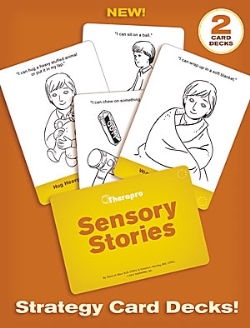For children with over-responsive sensory modulation, participating in everyday activities can be overwhelming. Victoria Nackley, MS, OTR/L, co-author of Sensory Stories presented a Therapro seminar on Saturday, October 18th entitled Using Sensory Stories and Sensory Strategy Cards
(45 Strategies to Add to Your Sensory Diet) to Promote Self-Regulation. She engaged the audience of about 60 therapists, teachers, parents and grandparents in learning how to use sensory stories as a therapeutic tool to help a child engage successfully in typical home, school, and community activities that intrinsically are loaded with sensory experiences. Victoria discussed the fact that 15 research studies currently support the theory that Sensory Stories promote a child’s ability to engage in day-to-day activities.
 Sensory Stories empower a child to cope with day-to day life activities such as getting dressed, riding the school bus, and going to the store. Victoria and her co-author, Deborah Marr, have developed 30 individual stories that can be customized to each child. She engaged the attendees as a group in a sensory story about brushing their teeth. The calming strategies recommended are simple and quick so that they can easily be incorporated into a task that a child finds difficult to accomplish. For example, calming strategies might involve deep touch pressure like a self-hug or using a towel to apply deep pressure to the skin.
Sensory Stories empower a child to cope with day-to day life activities such as getting dressed, riding the school bus, and going to the store. Victoria and her co-author, Deborah Marr, have developed 30 individual stories that can be customized to each child. She engaged the attendees as a group in a sensory story about brushing their teeth. The calming strategies recommended are simple and quick so that they can easily be incorporated into a task that a child finds difficult to accomplish. For example, calming strategies might involve deep touch pressure like a self-hug or using a towel to apply deep pressure to the skin.
For a child to feel successful everyday builds self-esteem and social acceptance. Sensory Stories add a powerful tool in our toolbox that can help a child learn self- regulation. Following are few of the many positive comments from those who attended the Sensory Stories seminar:
“Informative practical ideas that can be used right away.” Karen D.
“Exploded my ideas beyond the ‘typical’ applications of the Sensory Story cards.” Elizabeth S.
“Gives a very good presentation not only on Sensory Stories but also the importance of understanding sensory modulation.” Brooke W.
“She provided a great background/review on self-regulation. She gave many great examples and treatment ideas. I’m looking forward to trying them both with my clients and my own son!” Natalie S.
Thank you,Tory!
Filomena Connor, MS, OTR/L
